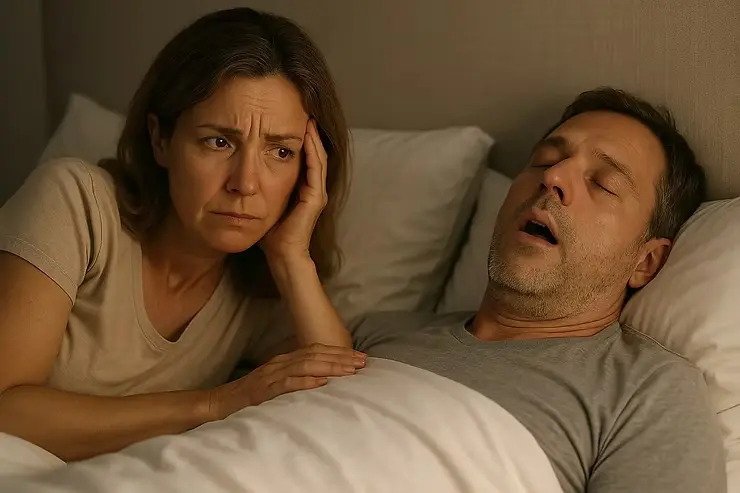1. What Is Sleep Apnea?
Sleep apnea is a serious and often underdiagnosed sleep disorder where breathing stops and starts repeatedly during sleep. These interruptions—called apneas (complete stops) or hypopneas (partial reductions)—disrupt restful sleep and make the brain awaken briefly to resume normal breathing
2. Types of Sleep Apnea
- Obstructive Sleep Apnea (OSA): The most common type, caused by relaxation of throat muscles leading to airway blockage
- Central Sleep Apnea (CSA): Occurs when the brain fails to send the proper signals to breathing muscles
- Complex Sleep Apnea: A combination of both OSA and CSA
According to Cleveland Clinic, roughly 1 billion adults aged 30 to 69 may suffer from OSA globally
3. Symptoms: Night & Day
At Night:
- Loud, persistent snoring
- Breathing pauses or choking/gasping episodes
- Restless or fragmented sleep
During the Day:
- Excessive sleepiness or fatigue
- Morning headaches, dry mouth, or sore throat
- Poor concentration, mood changes (irritability, depression)
- Cognitive issues like memory lapses
- Behavioral or academic problems, especially in children
4. Causes & Risk Factors
Obstructive Sleep Apnea (OSA):
- Excess weight, especially around the nec
- Narrowed airway, enlarged tonsils or tongue
- Chronic nasal congestion, hypothyroidism, PCOS
- Family history, male sex (2–3× higher risk before menopause)
- Aging—running into middle age increases risk
- Lifestyle: smoking and alcohol use worsen OSA
Central Sleep Apnea (CSA):
- Heart failure, stroke, neurologic conditions
- High-altitude exposure, medications like opioids
5. Serious Health Risks & Complications
Untreated sleep apnea can lead to profound health consequences:
- Cardiovascular risks: High blood pressure, arrhythmias, coronary artery disease, heart attack, heart failure, stroke
- Daytime hazards: Microsleeps and accidents—especially dangerous while driving or working
- Metabolic issues: Higher risk of type 2 diabetes, insulin resistance, fatty liver
- Neurocognitive effects: Memory impairment, earlier onset of cognitive decline, links to Alzheimer’s and depression
- Other: Complications with surgery, sedatives; eye conditions like glaucoma; disrupted relationships from snoring
Wired highlights that untreated OSA can reduce cognitive function and may speed up Alzheimer’s onset by nearly a decade
6. Recent Insights: “Social Apnea”
A new term —social apnea—refers to how weekend habits can worsen OSA severity:
- A study using mattress sensors found OSA severity increases by ~18% on Saturdays vs. midweek, with increases up to 47% in those indulging in sleep-ins (social jetlag) or weekend drinking/smoking
- Men and younger adults under 60 showed the greatest rise (21% increase in men, 24% in younger adults)
- Experts urge consistency in CPAP use on weekends, limiting alcohol and smoking, and maintaining regular sleep schedules
7. Diagnosis & Prevention
How It’s Diagnosed:
Severity Levels (AHI):
- Mild: 5–14 events/hour
- Moderate: 15–29 events/hour
- Severe: 30+ events/hour
Prevention & Management:
- Maintain healthy weight, avoid alcohol and smoking
- Improve sleep hygiene and avoid sleeping on the back
- Manage underlying conditions (hypertension, diabetes)
8. When to See a Doctor
Seek help if you—or your partner—notice:
- Loud snoring, gasping, or observed breathing pauses
- Frequent morning headaches, daytime fatigue, or mood changes
- Difficulty concentrating, waking unrefreshed
Early diagnosis via a sleep study can lead to significant health improvements—and possibly reduce long-term risks.
Summary
Sleep apnea is more than snoring—it's a debilitating condition with serious health implications. From daytime fatigue to long-term cognitive and cardiovascular risks, awareness and timely action are key. Emerging research like “social apnea” highlights the role of lifestyle in managing the condition. If symptoms resonate with you, a consultation with a sleep specialist is a great first step toward healthier rest and well-being

